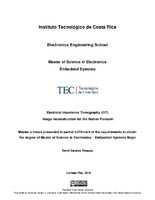Optimización de protocolos de comunicación SDR ejecutados en FPGA
Resumen
This project shows a methodology for the optimization digital communication systems implemented on
software radios SDR reducing the CPU and memory usage. The project was developed using the kit
Zedboard which is based on Xilinx Zynq 7000 series SoC. This SoC is known as hybrid because it
counts with a processing systems, PS, based on a ARM processor and a programmable logic based on a
FPGA. The PS executes GNU Radio software under a Linux operating System and for the
optimizations the communication blocks are implemented on hardware. To communicate PS and PL the
Xillybus interface is used.
Using Xilinx software tools two commonly used blocks for digital communication transmission and
receptors are implemented: a FIR filter and a FFT. Those blocks replace GNU Radio software blocks
that perform the same functionality, allowing to execute the same implementation with two different
approaches, one completely on software and one on a hybrid system.
Memory and CPU usage of the Zedboard for two blocks with the same functionality are compared, the
first case is a block running entirely in software and the second in the hybrid system. For FIR filters
with 5, 13 and 25 taps CPU usage was 4.52%, 77.73% y 66.92% respectively, the memory usage
measured was 25%; for the hybrid system CPU usage is reduced to the values between 15.27%, 8.68%
y 4.87% respectively with a memory usage of 24%. For FFT CPU usage was reduced from 96.00% to
32.255% with reduced memory usage from 29% to 24%.
Descripción
Proyecto de Graduación (Maestría en Electrónica) Instituto Tecnológico de Costa Rica, Escuela de Ingeniería Electrónica, 2015.


